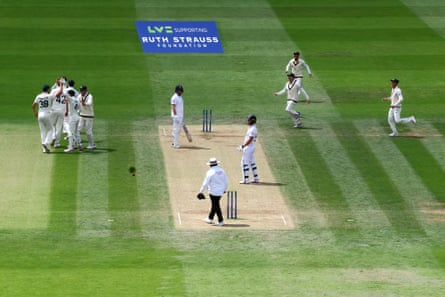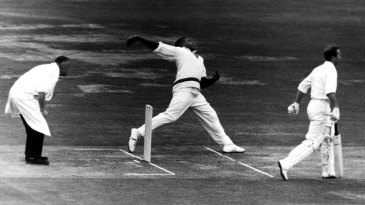In most sports, players simply follow the rules laid out for them, which are enforced by umpires or referees. If they break a rule, a consequence is applied and play resumes. There are times, naturally, when athletes are accused of being unsporting, but there is rarely a drawn-out debate over players following the rules exactly as written and being scolded for doing so.
Cricket is a very different beast in many ways. No more clearly did we see this play out than on day five of the second Ashes Test. Where the two cricketing nations of England and Australia are concerned, history is a living and hotly contested document, one that is constantly being grappled over and argued about. So as soon as Jonny Bairstow was stumped by Alex Carey and the third umpire sent him on his way, battle lines were drawn between Australian fans staking out their ground on the side of a “fair and legal dismissal” and the English abandoning their Sunday lunch plans to fight for “the spirit of cricket”.
For those Australians, the incident cut deep. The scars of sandpaper-gate are still visible. Memories are fresh of cricket heroes crying on international television, the prime minister indicting it as a “shocking disappointment” and Australian cricket being brought into disrepute. It all sits just below the surface. Yet as difficult as it was, most Australian fans took the criticism on the chin; they were equally disappointed with the team and prepared for the onslaught of derision.
However, this is a new era of the Australian men’s cricket team. The biggest criticism most people can make of captain Pat Cummins is that he cares too deeply about social issues. Coach Andrew McDonald seems satisfied to work in the background, rather than front the media. The team has rehabilitated its image considerably over the last five years.
So it was painful for the scars to be ripped open so forcefully and painfully as boos rang out around Lord’s, followed by cries of “Aussie! Aussie! Aussie! Cheat! Cheat! Cheat!” and “Same old Aussies, always cheating!”
Then there was the abuse of players as they walked through the Long Room to lunch, which was perhaps even more galling considering the waiting list of approximately 29 years and £500 ($955 AUD) annual membership fee paid to be part of this exclusive club.

With history simmering under the surface, it was shocking to watch the baying crowd hurl abuse at the touring players – not for breaking a key law of the game around attempting to alter the condition of the ball – but for their keeper throwing the ball at the stumps and effecting a stumping within the laws of the game.
Once the immediate injustice of the situation settled down, responses have mostly been tinged with bemusement. Most people can name a similar incident that occurred in club or junior cricket, with an unsuspecting batter, who did not quite have a grasp on what a crease was or the importance of staying in one while batting, caught out by a more wily wicketkeeper.
Many Australians have been quick to point out the hypocrisy of the uproar from England – with incidents from Bairstow’s shy at the stumps of Marnus Labuschagne the day before, to his similar dismissal of New Zealand’s Colin de Grandhomme in a 2022 Test match, to current England coach Brendon McCullum’s dismissal of Sri Lanka’s Muttiah Muralitharan while the latter was celebrating the century of teammate Kumar Sangakkara.
The mood of the nation was neatly summed up by cricket writer Dan Liebke who noted: “Always very interesting to me how the spirit of cricket seems to revolve around England batters being allowed to bat on even when they’re out.”
Between the jokes, there is a genuine confusion about what the “spirit of cricket” entails and when it is applied. These debates usually crop up whenever a Mankad is effected, but to have widened the field to include stumpings makes things even more complicated. For Australian fans, it was one thing to face up to the accusation of cheating when it was true, but quite another when it occurred in this murky, grey area between the rules and the mysterious “spirit of the game” – an area for which England, at least, seem to hold a map.
